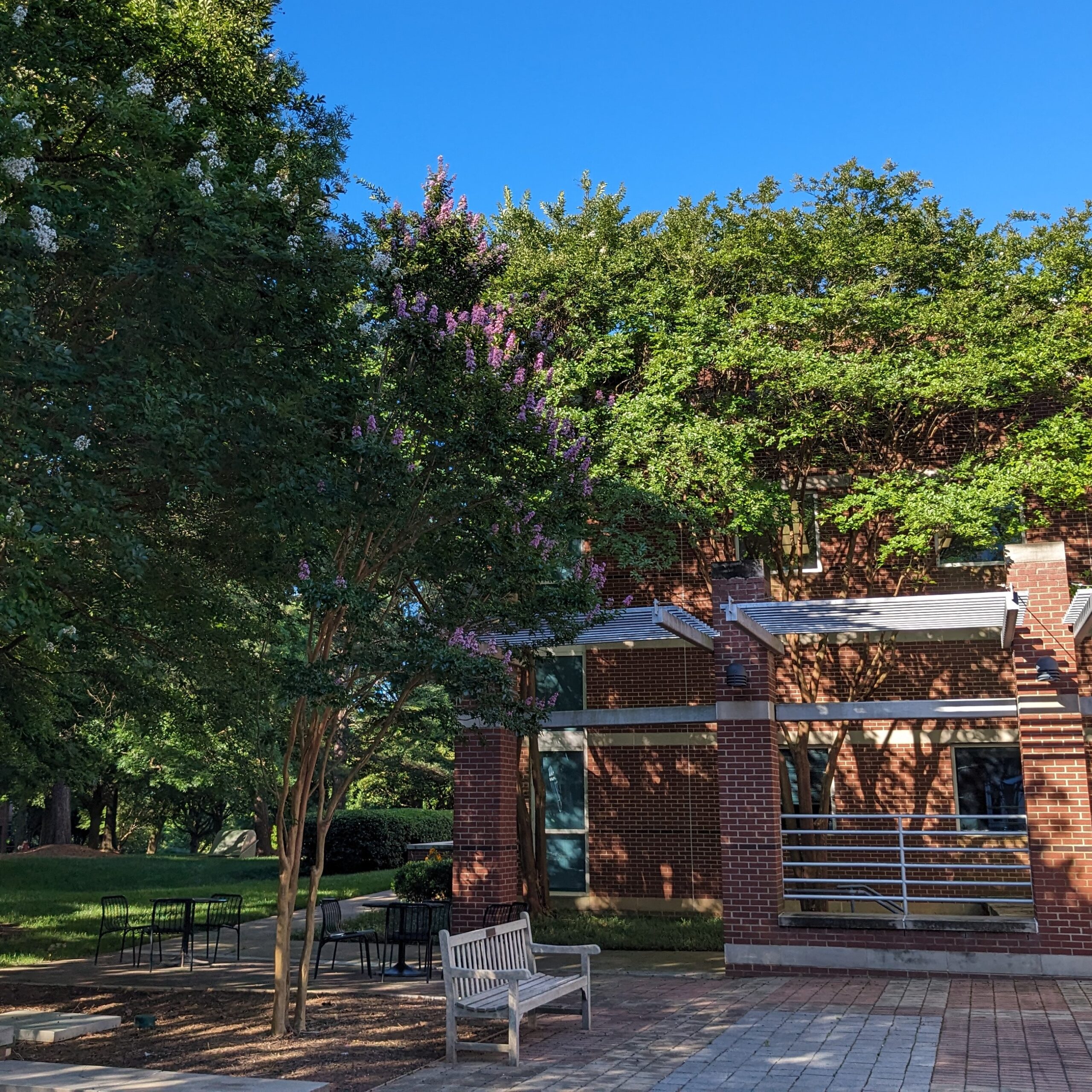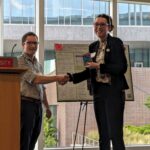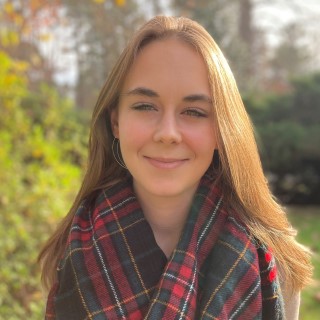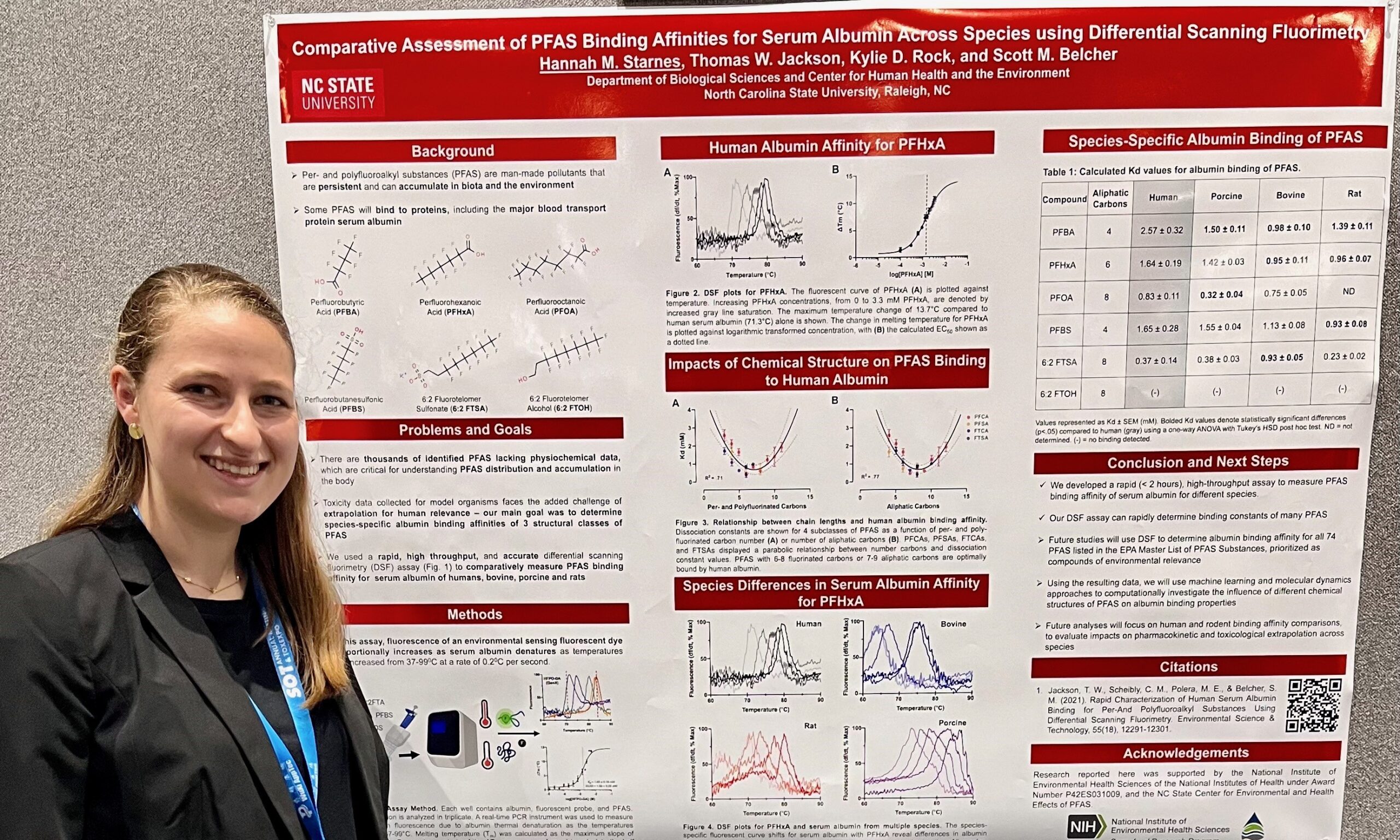Summer is here! Or so says the academic calendar…
It may be quieter in the courtyard and across campus, but we know you all are busy with benchwork, grant writing, and dissertation defending. Good luck to all TGP members during your summer endeavors!
Featured Stories:
Featured Lab: Buchwalter Lab
Freshwater ecosystems contain a disproportionate amount of the Earth’s biodiversity and are challenged by myriad anthropogenic insults. Aquatic insects are widely used by ecologists to make inferences about the “health” of aquatic ecosystems, but they remain understudied with respect to the physiological and toxicological mechanisms that determine their responses to environmental stressors. The Buchwalter lab uses a variety of approaches (respirometry, radiotracers, -omics and bioassays) to explore how abiotic (temperature, salinity, hypoxia) and chemical stressors affect aquatic insects. The lab uses comparative approaches and is developing the mayfly Neocloeon triangulifer as a model organism for mechanistic studies.
Meet the Team:

David Buchwalter, PI
David Buchwalter received his Ph.D. at Oregon State University in the Department of Environmental and Molecular Toxicology in 2002. His postdoctoral work with Dr. Samuel Luoma at the US Geological Survey’s Menlo Park, CA laboratory launched his foray into understanding trace metal bioaccumulation in aquatic insects. He joined the faculty at NC State in 2005 and is now a Full Professor who mentors graduate students through the Toxicology Program and Biology Graduate Program.

Bryant Mendoza, Graduate Student in the Toxicology Program
Bryant Mendoza, a M.S. student, joined the Buchwalter Lab in the Fall of 2023 as a Fulbright Scholar from Nicaragua. His work is examining the interactions of freshwater salinity and dissolved oxygen availability in aquatic insects.
Featured Publication:
Starnes HM, Jackson TW, Rock KD, Belcher SM (2024) Quantitative cross-species
comparison of serum albumin binding of per- and polyfluoroalkyl substances from five
structural classes. Toxicol. Sci., 199(1):132-149. Link
First author Hannah Starnes defends her dissertation on June 7 at 3:30pm in the
Toxicology Auditorium. She has accepted a position as a Senior Environmental Toxicologist
at ICF. Co-author Thomas Jackson graduated from the Toxicology Program in 2021 and
is currently a Postdoctoral Biologist at EPA. Co-author Kylie Rock graduated from the
Toxicology Program in 2019, returned to NC State as a postdoc in 2021, and is currently
an Assistant Professor at Clemson University. Senior author Scott Belcher is a
Professor in the Department of Biological Sciences and a member of the Toxicology
Graduate Program faculty.
Per- and polyfluoroalkyl substances (PFAS) are a class of thousands of structurally
diverse manmade persistent organic pollutants. Many PFAS chemicals are persistent,
mobile, bioaccumulative, and toxic, and the widespread use of PFAS for industrial and
commercial applications represents a major environmental and public health concern
worldwide. Unlike other persistent organic pollutants, PFAS have a high affinity for
proteins and accumulate at the highest concentrations in protein-rich and highly
perfused tissues, including the blood, liver, and kidneys. While protein binding is known
to play major roles in PFAS bioaccumulation, distribution, and toxicity, experimental
studies quantifying protein-PFAS binding are limited to a small subset of this large and
diverse chemical class.
In this study, Starnes et al. utilized a rapid and novel in vitro assay called differential
scanning fluorimetry to calculate directly comparable binding affinities for the major
blood transport protein, serum albumin, to a structurally informative set of PFAS. Serum
albumin is the predominant protein that binds many PFAS congeners in human blood,
and is known to have a major influence on PFAS toxicokinetics and serum half-life.
Further, Starnes et al. comparatively evaluated the binding affinities of human serum
albumin to PFAS, as well as experimental model (rat) and livestock (cow and pig) serum
albumin, to investigate a possible mechanistic basis for the extreme interspecies
differences observed in PFAS circulatory half-lives.
Overall, the study reveals significant interspecies differences in albumin binding
affinities for all PFAS congeners tested, and provides critically needed data that can be
used to improve predictive modeling of PFAS toxicokinetics and toxicity. Further, these
data are important for reducing interspecies uncertainty, to enable increased confidence
in extrapolation of animal model toxicity data for human relevance.
New Faculty:
The TGP welcomed two new additions to our faculty ranks this Spring semester:
Dr. Yogesh Saini, Professor of Pulmonary Immunology and Toxicology
Dr. Nadine Kotlarz, Assistant Professor of Civil, Construction, and Environmental Engineering
We look forward to the collaborations these new additions will foster.
Awards & Notable Events
The Third Annual Toxicology Student Symposium was held Thursday, May 9 at the Hunt Library. Dr. Emma Hinkle of MedThink SciCom was our Keynote Speaker. First through third year students gave talks, while fourth year and above students presented posters. The event was capped off with a social hour and awards ceremony. Awards were given to best talk (by year) and best poster. Winners were presented with a $100 gift card. Recipients include:
Britney Paul (Hoppin Lab) – Best first year talk
Gillian Szabo (Gaddameedhi Lab) – Best second year talk
Emma Tobin (Hall Lab) – Best third year talk
Morgan Ritter (Kullman) – Best poster
Additional program award recipients were announced. The 2024-2025 Ernest Hodgson Travel Award, a $500 award, open to all students, for travel to a conference of their choice where they can participate and present their research was awarded to Velma Shang, a second year student in the Cowley Lab. Velma plans to present her research on hepatocellular carcinoma and early life cadmium exposure.
The 2024-2045 Toxicology Founders Award, a $2000 award is available to those students that have passed their preliminary oral exams. It is intended to be used to supplement the graduate experience, through travel to a workshop, conference, or other scientific meeting that may not normally be available to a PhD candidate. This year the TGP had funds to award 3 Founders Awards. Recipients are:
Ryan Bartone, a third year candidate in the Bonner lab. Ryan has plans to attend the International NanoTox meeting presenting data from his project, “House Dust Mite Extract Proteins Adsorb to Multi-Walled Carbon Nanotubes to form an Allergen Corona that Intensifies Allergic Lung Disease in Mice.”
Sean Cone, a fourth year candidate in the Gaddameedhi lab. Sean plans to use the award towards his travel to both the Environmental Mutagenesis and Genomics Society 55th Annual Meeting in Palm Springs, California and the Society for Research on Biological Rhythms Biennial Meeting at Puerto Rico where he will present his research, “Environmental Circadian Disruption Aggravates Skin Cancer Progression in Mice.”
Logan Dameris, a fourth year candidate in the Cowley lab. Logan plans to attend the Annual Non-coding RNA Symposium 2024. He knows this meeting will strengthen his knowledge on ncRNAs, building on the coursework from his Genetics minor, giving him a chance to apply this new found knowledge to the last parts of his dissertation project, as well as give him the opportunity to present his research to a new audience.
Congratulations to all our awards recipients!
Roland Gonzalez (2nd year Toxicology PhD) and Aoi Nakanishi-Hester (2nd year DVM/PhD in CBS program) in Ninomiya-Tsuji’s lab were each awarded a 2024 DiscoverBMB (Biochemistry and Molecular Biology) Travel Award ($1000 each). They attended ASBMB (American Society of Biochemistry and Molecular Biology) meeting in San Antonio TX on March 23-27, which included career development seminars and an opportunity to present their posters. Roland Gonzales’s travel was supported also by the 2023-2024 Ernest Hodgson Travel Award.
Hong Wang, professor in the Department of Physics, was recently presented with the Outstanding Teacher Award by the University. This award recognizes teaching at all levels. Congratulations Hong!
Detlef Knappe, professor of Civil, Construction, and Environmental Engineering, has received the 2024 Frederick George Pohland Medal from the Association of Environmental Engineering and Science Professors (AEESP) and AAEES (American Academy of Environmental Engineers and Scientists). The Pohland medal honors those individuals who have made “sustained and outstanding efforts to bridge environmental engineering research, education, and practice,” according to AEESP.
Michael Roe, Professor of Entomology and Plant Pathology, reports his DEET-free insect and tick repellent received a US EPA registration in April 2023. The product global launch countdown clock is ticking and can be seen at Mimikai.com. At the time of this note, the countdown is at 14 days. The EPA approved label is for 8 hours of protection for mosquitoes and 4 hours for ticks. The repellent is from bananas. Mimikai is a NCSU startup company. The development of this product is a good example of how toxicology studies can lead from the lab to the store shelf, improving the human condition and fighting nature with nature.
The Data Science and Environmental Health Science Research Symposium, held April 5 at the Hunt Library was a big success. This symposium sought to bring together big data specialists and researchers from across the country to foster collaboration and discussion in the field of data science. The event was hosted and organized by Seth Kullman and was written up in NIEHS Environmental Factor. Thanks Seth for pulling together a great day of data!
Kullman-Marsden R21 Seth Kullman and Kurt Marsden announce their R21: Gene environment interactions in sensory processing deficits has been approved! Summary: Emerging evidence demonstrates the importance of not just looking at genetics or the environment but rather, the interactions between genetic diversity and environmental exposures influencing human health and disease, including sensory processing disorders associated anxiety, autism, and schizophrenia. The etiology of sensory processing disorder remains equivocal; however, it is hypothesized that environmental factors including exposures to environmental contaminants can be important. This proposal uses a novel and powerful new model, the medaka fish, for determining gene-environment interactions that contribute to deficits in sensory processing behaviors observed with neuro-psychiatric conditions
Hannah Starnes‘ dissertation defense seminar will be held 3:30 pm, Friday, June 7 in the Toxicology Auditorium.
Toxicology New Graduate Student Orientation is tentatively scheduled for Monday, August 19, from 2:00-3:30, in Tox 2102.
The Toxicology Recruitment Event is scheduled for February 20-21, 2025.
The 4th Annual Toxicology Student Symposium is scheduled for Thursday, May 8, 2025.
News
- Categories:














